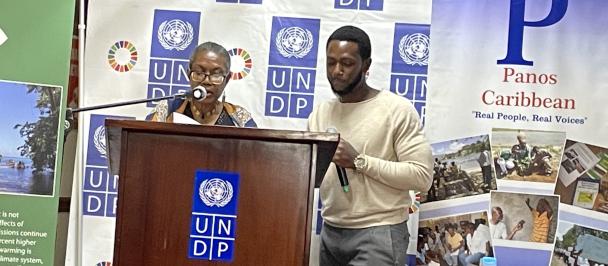UNDP ready to scale up disaster risk resilience support – Resident Representative
May 22, 2024

Director General (Acting), Jamaica's Office of Disaster Preparedness and Emergency Management (ODPEM), Richard Thompson poses with UNDP Residenpresentative, Kishan Khoday following UNDP's Disaster Risk Resilient Knowledge Exchange on 17 May, 2024.
Watch the Resilient 2 Livestream: Disaster Risk Resilience Knowledge Exchange
The United Nations Development Programme (UNDP) is committed to scaling up programming on Climate Change Adaptation, Disaster Risk Reduction and early recovery in partner countries and territories served by its Multi Country Office in Jamaica, says Resident Representative, Kishan Khoday.
Addressing UNDP’s Disaster Risk Resilience Knowledge Exchange last week ahead of the 2024 Hurricane Season, Mr. Khoday said his organization’s offer remains strongly focused on strengthening capacities to better manage risk and achieve just and resilience development pathways.
“Today we stand in solidarity with our country partners, local officials and communities across the Caribbean, to implement the new outcomes expected from the 4th Global SIDS Conference taking place here in the Caribbean. This includes enhanced policies and institutions that can manage increasing levels of complexity and put in place risk-informed development policies and plans. UNDP today stands as the UN's largest implementer of grant assistance for climate action globally and we seek to support partners in the region address growing levels of climate vulnerability", Mr. Khoday explained.
In outlining his nation’s resilience plans, The Bahamas’ Minister of State in the Office of the Prime Minister Hon Leon Lundy, pointed to a range of infrastructural, policy and outreach interventions, including the ongoing construction of a climate resilient community shelter on Abaco financed by the government of India and implemented in partnership with the UNDP. “The shelter symbolizes our commitment to providing safe havens for our citizens during hurricanes and other disasters,” he stated. He also noted that his government will be strengthening its emergency management arrangements and disaster risk governance, prioritizing the development of a strong regulatory environment for climate, resilient infrastructure.
Jamaica’s ODPEM Acting Director-General Richard Thompson underscored the importance of social capital and community capacity building in disaster emergency response including Community Emergency Response Teams. He said training and capacity development are consistently implemented. “There's shelter management training right throughout the year to ensure that we are building that capacity at the local level,” he stated.
And in continuation of the dialogue on governance arrangements for resilience, Chairman of The Bahamas’ Disaster Risk Management Authority (DRMA), Alex Storr highlighted the importance of a sound regulatory environment. He said his government’s recent establishment of the DRMA through a merger of the Disaster Reconstruction Authority, National Emergency Management Authority (NEMA) and the Ministry of Disaster Risk Management had created an agile and flexible state-owned enterprise.
Presentations were also shared by Aarone Sargent, Managing Director (Acting) Disaster Reconstruction Authority (DRA), The Bahamas; Brian Been, Policy, Planning and Programme Manager in the Ministry of Tourism, Environment, Fisheries and Marine Affairs, Culture and Heritage, Agriculture and Religious Affairs, Turks and Caicos Islands Government; Anila Qehaja, UNDP Information Management Specialist; and Hartley Eugene Thompson II, UNDP Engineer/Architect.
The Disaster Risk Resilience Knowledge Exchange is part two of UNDP’s Resilient Series, conceptualized to share lessons and best practices for a climate resilient future. It also fulfils the requirement for south-south exchanges under the UNDP-implemented Abaco hurricane shelter project financed by India and is a key development solution under UNDP’s Multi-Country Programme (2022-2026) under which UNDP supports local initiatives for resilient and sustainable development in The Bahamas, Bermuda, Cayman Islands, Jamaica and Turks and Caicos Islands.

 Locations
Locations



